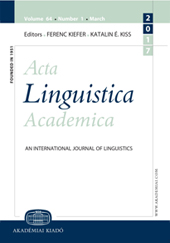Two types of free choice universality across languages
Two types of free choice universality across languages
Author(s): Mara PanaitescuSubject(s): Semantics
Published by: Akadémiai Kiadó
Keywords: subtrigging; serial universality; parallel universality; event related reading; causation
Summary/Abstract: The paper teases apart two types of interpretations displayed by so-called “universal” free choice (FC) determiners (e.g., French n’importe quel or Spanish cualquiera) depending on the kind of licensing environment they are placed in, which will be called parallel and serial universality respectively. Since serial universal readings are available to all FCIs cross-linguistically and the only possibility in some cases, they are taken to be the central semantic ingredient of free choice. Section 2 aims to establish a parallel between serial universality (particularly subtrigged sentences) and other constructions which involve semantically constrained pairs of events. The third section represent the co-variation of entity, event and world indices as an option that determiners have under certain (syntactic and semantic) conditions, and which FCIs have grammaticalized. The other ingredient which singles out serial universality from other event-related readings is the (non-optional) causal link between the events introduced by the relative clause and matrix events. The link between relative clause and matrix events is analyzed as a form of historical necessity, a relation between cause and effect, as understood within a metaphysical modal base.
- Issue Year: 65/2018
- Issue No: 4
- Page Range: 669-701
- Page Count: 33
- Language: English
- Content File-PDF

